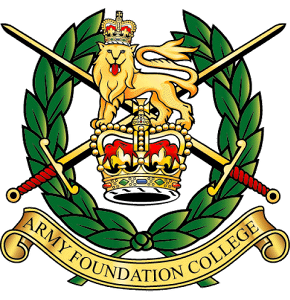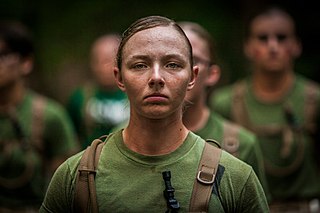A private is a soldier, usually with the lowest rank in many armies. Soldiers with the rank of private may be conscripts or they may be professional (career) soldiers.

Military recruit training, commonly known as basic training or boot camp, refers to the initial instruction of new military personnel. It is a physically and psychologically intensive process, which resocializes its subjects for the unique demands of military employment.
A groom is a male participant in a wedding ceremony.

A résumé, sometimes spelled resume, is a document created and used by a person to present their background, skills, and accomplishments. Résumés can be used for a variety of reasons, but most often they are used to secure new employment.

Recruitment is the overall process of identifying, sourcing, screening, shortlisting, and interviewing candidates for jobs within an organization. Recruitment also is the process involved in choosing people for unpaid roles. Managers, human resource generalists, and recruitment specialists may be tasked with carrying out recruitment, but in some cases, public-sector employment, commercial recruitment agencies, or specialist search consultancies such as Executive search in the case of more senior roles, are used to undertake parts of the process. Internet-based recruitment is now widespread, including the use of artificial intelligence (AI).

Military education and training is a process which intends to establish and improve the capabilities of military personnel in their respective roles. Military training may be voluntary or compulsory duty. It begins with recruit training, proceeds to education and training specific to military roles, and sometimes includes additional training during a military career. Directing staff are the military personnel who comprise the instructional staff at a military training institution.

The RMC Paladins are the athletic teams that represent Royal Military College of Canada in Kingston, Ontario, Canada. Its facilities include the Kingston Military Community Sport Centre (KMCSC) with seating for 3737, the Navy Bay fields with seating for 800 and Constantine Arena with seating for 1500 and the Birchall Pavilion.
Counter-recruitment refers to activity opposing military recruitment, in some or all of its forms. Among the methods used are research, consciousness-raising, political advocacy and direct action. Most such activity is a response to recruitment by state armed forces, but may also target intelligence agencies, private military companies, and non-state armed groups.

Military recruitment refers to the activity of attracting people to, and selecting them for, military training and employment.

United States Marine Corps Women's Reserve (Reserve) was the World War II women's branch of the United States Marine Corps Reserve. It was authorized by the U.S. Congress and signed into law by President Franklin D. Roosevelt on 30 July 1942. Its purpose was to release officers and men for combat, and to replace them with women in U.S. shore stations for the duration of the war plus six months. Ruth Cheney Streeter was appointed the first director. The Reserve did not have an official nickname as did the other World War II women's military services.
Executive search is a specialized recruitment service which organizations pay to seek out and recruit highly qualified candidates for senior-level and executive jobs across the public and private sectors, as well as non-profit organizations. Headhunters may also seek out and recruit other highly specialized and/or skilled positions in organizations for which there is strong competition in the job market for the top talent, such as senior data analysts or computer programmers.

Military personnel or military service members are members of the state's armed forces. Their roles, pay, and obligations differ according to their military branch, rank, and their military task when deployed on operations and on exercise.

In college athletics in the United States, recruiting is the process in which college coaches add prospective student athletes to their roster each off-season. This process typically culminates in a coach extending an athletic scholarship offer to a player who is about to be a junior in high school or higher. There are instances, mostly at lower division universities, where no athletic scholarship can be awarded and where the player pays for tuition, housing, and textbook costs out of pocket or from financial aid. During this recruiting process, schools must comply with rules that define who may be involved in the recruiting process, when recruiting may occur and the conditions under which recruiting may be conducted. Recruiting rules seek, as much as possible, to control intrusions into the lives of prospective student-athletes. The NCAA defines recruiting as “any solicitation of prospective student-athletes or their parents by an institutional staff member or by a representative of the institution’s athletics interests for the purpose of securing a prospective student-athlete’s enrollment and ultimate participation in the institution’s intercollegiate athletics program."

The Army Foundation College (AFC) in Harrogate, England, is the sole initial military training unit for British Army recruits who enlist aged between 16 and 17.5 years.

Since the Israeli Declaration of Independence in 1948, fixed-term military service has been compulsory in Israel. The draft laws of the Israel Defense Forces (IDF) only apply to Jews, Druze, and Circassians. Because the Druze and Circassian communities are less populous, their women are exempted from mandatory military service altogether. Women from the Jewish community are not exempted, but serve for slightly shorter terms than their male counterparts. The IDF does not conscript non-Druze Arab citizens of Israel, though their men and women may enlist voluntarily.
Clandestine HUMINT asset recruiting refers to the recruitment of human agents, commonly known as spies, who work for a foreign government, or within a host country's government or other target of intelligence interest for the gathering of human intelligence. The work of detecting and "doubling" spies who betray their oaths to work on behalf of a foreign intelligence agency is an important part of counterintelligence.
Cop or Cops commonly refers to:

An assessment centre is a process where candidates are examined to determine their suitability for specific types of employment, especially management or military command. The candidates' personality and aptitudes are determined by techniques including interviews, group exercises, presentations, examinations and psychometric testing.

There have been women in the United States Marine Corps since 1918, and women continue to serve in the Corps today. As of 2020, women make up 8.9% of total active duty Marines. The Marine Corps has the lowest percent of female service members of all of the U.S military branches. Women's presence in the Marine Corps first emerged in 1918 when they were permitted to do administrative work in an attempt to fill the spots of male Marines fighting overseas. It was not until 1948 that women were able to become a permanent part of the Corps with the passing of the Women's Armed Services Integration Act. However, even with the Integration Act, women were still banned from certain military occupation specialties. It was not until 2016 that Defense Secretary Ash Carter announced that all military occupations would be open to women without exception. As of 2018, there were 18 women serving in the Marine Corps combat arms. In December 2020, the Marine Corps Recruit Depot San Diego agreed to join the Marine Corps Recruit Depot Parris Island in accepting female recruits, with 60 female recruits starting their boot camp training at the San Diego depot in February 2021. 53 of these recruits would successfully graduate from boot camp in April 2021 and become Marines.
Claudia Nonhlanhla Ndaba is a South African politician. A member of the African National Congress, she has served as the Chairperson of the Portfolio Committee on Women, Youth and People with Disabilities since 2019 and has been a Member of the National Assembly of South Africa since 2014. She served as Chairperson of the Ad Hoc Committee on the Filling of Vacancies in the Commission for Gender Equality twice during her first term in parliament. Prior to her election to parliament, Ndaba served as a Member of the Gauteng Provincial Legislature from 2009 to 2014.












